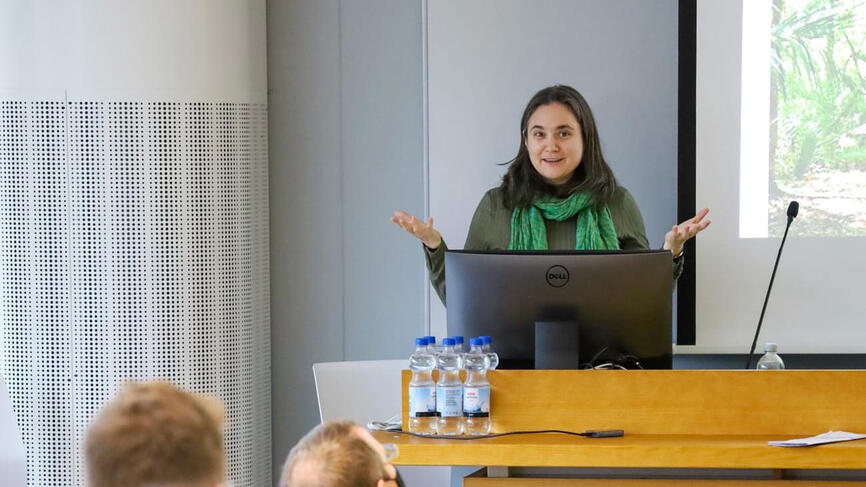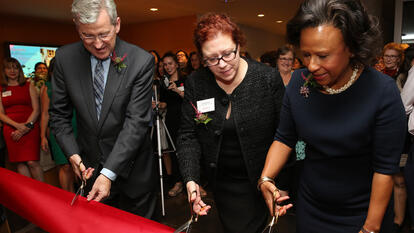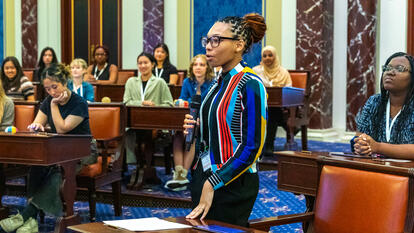
Across the U.S., Wellesley Alumnae Are Helping Communities Become Climate Resilient
Officials from nearly 200 countries gathered in Glasgow for two weeks this month for the 26th U.N. Climate Change Conference, known as COP26. Young climate activists descended on the city to urge world leaders to act, the U.S. and China announced a surprise climate agreement to accelerate emissions reductions to reach the goals set by the 2015 Paris Agreement, and India committed to reaching net-zero emissions by 2070. Ultimately, negotiators reached an agreement intended to encourage countries to strengthen near-term climate targets and accelerate their shift away from fossil fuels, and urged wealthy, high-emission countries to help fund the rising costs of climate change faced by more vulnerable nations.
In the United States, across higher education, government, and the private sector, three Wellesley alumnae are playing key roles in improving sustainability and climate resilience in their own communities.
Bringing an Academic Lens to City Sustainability Plans
“The pending climate and ecological crises will demand a change in the ways we live in and organize our society, greater than any other change we have known,” said Selina Gallo-Cruz DS ’06, associate professor of sociology and anthropology at the College of the Holy Cross in Worcester, Mass. “In my role as a social scientist, I am primed to always ask, ‘How can things be different?’”

Gallo-Cruz found herself reflecting on that question in the context of her home community, when a fellow activist in the Worcester chapter of Mothers Out Front, a national grassroots organization working to preserve a livable climate, invited her to join the city’s Citizen’s Green Planning Committee to help develop a climate resiliency plan.
Working alongside her neighbors, Gallo-Cruz researched what Worcester could learn from other communities. “I was inspired to make a formal study of city climate planning in different locations, in the hopes that other cities were devising plans more in alignment with the exigent warnings of climate scientists,” Gallo-Cruz said. She was concerned that the consultants Worcester hired to assist with this effort were focusing on branding Worcester as a “green city” rather than on building a climate-resilient blueprint to help the city adjust to future changes.
Gallo-Cruz reviewed sustainability plans from six cities as well as plans provided by a number of civic and nonprofit organizations. “The process opened my eyes to the many different ways a city could organize its sustainability plan, with significantly divergent outcomes,” Gallo-Cruz said. On her own time, she interviewed sustainability managers of other Massachusetts cities, attended workshops with state and national organizations on strategic planning for transitioning away from gas heating, and reviewed city plans the committee hadn’t considered but that had been praised for their ambition and progressive approaches.
This year, Gallo-Cruz is continuing her research on an international scale, as the 2021–2022 Fulbright-Tampere University Scholar in Tampere, Finland. There, she is learning how structural and cultural variables lead to significantly divergent city-level approaches to climate resiliency planning. She has built a dataset of 24 city sustainability plans and accompanying reports, and she is examining the goals and targets of each plan in depth and interviewing community organizers, activists, sustainability managers, scientists, and global policymakers.
We have to reduce our harmful impact on the planet, but, in doing so, we can generate new opportunities and enhance our quality of life, so long as we collectively rise to the challenge.
Catherine McCandless ’14
So far, Gallo-Cruz’s research points to the need for cities to better integrate sustainability plans in all aspects of city development. She has also noticed an alarming divergence between the language of progress and progress itself. “Cities are quick to adopt the language of sustainability as they model other city green plans, as we did in Worcester,” Gallo-Cruz said. “But even as it’s easy to pick up on buzzwords that symbolize green policy, environmental research reveals that the practices associated with these terms may have negligible or no meaningful effect on emissions, waste, and general ecological impact.” She cites the examples “net-zero” and “zero waste,” two labels that research in building design and waste management show are applied to practices proven to increase emissions and waste.
Gallo-Cruz hopes to take the datasets back to the U.S., to help guide action away from technological solutions and toward the difficult task of reorganizing the economy and our society so that we can reduce our dependence on consumption that contributes to high emissions.
“We have long known and understood the changes we could make that would drastically reduce our ecological footprint,” Gallo-Cruz said. “Figuring out how to make these practices into concrete policies is the real challenge in the face of technological proposals that promise the ‘greening business-as-usual.’”
A Local Approach to Climate Resilience Work
In Boston, Catherine McCandless ’14 is implementing many of the strategies Gallo-Cruz’s research supports. As a climate change and environmental planning project manager with the city’s environmental department, she is working to save the natural world from climate change’s worst effects and forge a healthier, more sustainable way of life.
“We have an opportunity to adapt our infrastructure to better serve people and nature, change our standards for efficient and resilient building design, eliminate our need for energy sources that are environmentally destructive and wreak havoc on our health, transition our diets away from industrial farming, and create a circular economy that is more sustainable in terms of resource consumption and waste production,” said McCandless. “We have to reduce our harmful impact on the planet, but, in doing so, we can generate new opportunities and enhance our quality of life, so long as we collectively rise to the challenge.”
McCandless works with coastal resilience projects under the Climate Ready Boston initiative as well as projects that seek to protect and enhance Boston’s wetlands and open spaces. Plans include creating more tree canopy coverage throughout the city, expanding neighborhood-level climate adaptation plans and community outreach and engagement initiatives, and assisting with grant applications that help fund major infrastructure projects. The goal is to prepare Boston to handle sea level rise, increasing precipitation, extreme heat, more frequent storms, and other effects of climate change.
For McCandless, the job is an almost perfect extension of the biology and architecture that she studied at Wellesley, even if it didn’t always seem that way. “People often noted that this was a strange combination of majors, and I didn’t really know what I wanted to do professionally when I graduated,” McCandless said. “But I felt like studying the two seemingly unrelated disciplines was the right fit for me.” In the spring of her junior year, a possible path forward began to emerge. McCandless took an ecology course with Nicholas Rodenhouse and worked on a research project on the impact of urbanization on global biodiversity loss. “I became fascinated by the impact of urbanization on our environment and climate, and the way that our environment shapes how we build our cities and towns,” McCandless said.
The pending climate and ecological crises will demand a change in the ways we live in and organize our society, greater than any other change we have known.
Selina Gallo-Cruz DS ’06
Now, McCandless sees a relationship between biology and architecture in almost every project she touches, and she particularly enjoys having the opportunity to, as she put it, transform our relationship with both our built and natural environments.”
In all of her projects, including the Coastal Resilience Solutions for East Boston and Charlestown (Phase II) project she is leading, McCandless keeps issues of equity front and center. “Above all else, we aim to conduct our work with a focus on equity, because our BIPOC communities have been and continue to be disproportionately burdened by environmental pollution and climate-related hazards, primarily extreme heat and flooding during storms. Our mission is to eliminate the burden on these communities and ensure that the benefits and opportunities associated with climate adaptation are distributed equitably.”
Bridging Government and Industry to Cut Greenhouse Gas Emissions
On the West Coast, Angela Xiong ’09, a climate change and resilience consultant who recently accepted a position on the sustainability, energy, and climate change team at WSP USA, works on similarly pressing issues for a number of California cities. Her focus is often on coordinating with local government and other public agencies to create climate action and adaptation plans to help jurisdictions achieve greenhouse gas (GHG) reduction targets.
“My goal is to support more cities and counties across California in crafting holistic climate action and resilience plans that are well-integrated into other planning efforts, such as planning for new affordable housing, public health and safety, and environmental justice and equity,” she said.
Consulting allows Xiong to have a hand in a wide array of projects while building relationships across industries and municipalities. “Each city, county, or public agency is unique, with distinct challenges and needs,” she said. “There are some common emissions sectors that are challenging for all clients, like transportation and building energy, but the solutions that are feasible for one client may not be for another, so my job involves a lot of problem-solving.”

While Xiong is encouraged by California’s ambitious climate targets and its willingness to call out links between environmental and climate justice, she has concerns about local governments’ constant struggle to find consistent funding for climate resiliency projects and the question of incremental versus transformational change.
“A lot of my work is focused on improving the status quo, tweaking policies here and there to try to achieve X amount more GHG reductions,” Xiong said. “I sometimes worry that by being so focused on these small improvements, we’re locking ourselves into a future that is still shaped around our current consumption patterns and behaviors.”
Xiong, like McCandless, is following a path that she hadn’t necessarily prepared for as an English and religion double major. An internship at the Asian Rural Institute, a leadership development program for grassroots leaders from around the world to learn sustainable agricultural techniques that she found through Wellesley’s Summer Internship Program, sparked her passion for sustainability.
“Every morning, I got up at sunrise to work in the fields with other volunteers, and I became familiar with the lifecycle of a vegetable: We planted the seeds, weeded, nurtured, harvested, and ate what we grew,” she said. “And, in the end, we composted the scraps to nurture new plants. It was very simple, no waste, and that cycle really stuck with me. It shaped how I live personally, as a vegetarian, a bike commuter, and a composter, and gave me purpose.”



